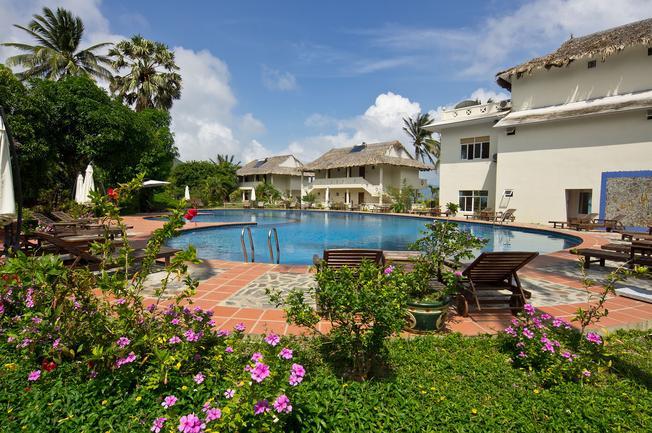Tầm Quan Trọng của Sự Phát Triển Du Lịch Bền Vững
Vậy phát triển du lịch bền vững mang lại những ưu điểm gì và cá nhân có thể đóng góp như thế nào cho quá trình phát triển du lịch bền vững? Cùng mytourblogs.com khám phá nhé!
1. Định Nghĩa của Phát Triển Du Lịch Bền Vững
Theo Tổ Chức Du Lịch Thế Giới - WTO, phát triển du lịch bền vững là sự phát triển tập trung vào lợi ích kinh tế và xã hội mang tính bền vững, đảm bảo sự đóng góp cho bảo tồn và tôn tạo các nguồn tài nguyên, duy trì sự toàn vẹn về văn hóa để phát triển hoạt động du lịch trong tương lai; đồng thời, đóng góp vào công tác bảo vệ môi trường và nâng cao chất lượng sống của cộng đồng địa phương.
Sustainable tourism development takes top priority today. Image: Collected
2. Why is sustainable tourism development necessary?
Preserving the Living Environment
Sustainable tourism development helps preserve the living environment. It conserves valuable natural resources, optimally utilizing them not only to meet current needs but also to ensure future development. Additionally, it minimizes environmental impact, avoiding pollution of water, air, and soil. This ensures a harmonious living environment for both wildlife and human beings.
Sustainable tourism contributes to the preservation of the living environment. Image: Collected
Sustainable Economic Development
Sustainable tourism development also promotes economic growth, ensuring long-term economic activities and contributing economically to the community. For example, by exploiting the cultural specialties of the region, local residents can improve their livelihoods through tourism activities. They provide tourism services and unique regional products. Additionally, sustainable tourism development creates job opportunities for tourists, local authorities, and residents.
Cultural Exchange and Conservation
The development of sustainable tourism will create more opportunities for travelers to meet local people and learn about traditional culture. Community involvement adds value to sustainable tourism programs. Traditional communities often feel proud due to the significant interest of tourists. Sustainable tourism always respects the social and cultural authenticity of local communities, preserving cultural heritage and traditional values.
3. Principles of Ensuring Sustainable Tourism Development
Reasonable Exploitation and Use of Resources
Sustainable development advocates leaving a natural resource base for future generations no less than what previous generations enjoyed, preventing changes that can be avoided for non-renewable environmental resources. It aims to reduce excessive resource consumption and minimize environmental waste, avoiding environmental degradation that leads to unsustainable development in tourism and the overall economy.
Tourism development must be linked to the conservation of biodiversity
In addition to biodiversity, cultural and social diversity is also a strength of each country to satisfy the diverse needs of tourists for tourism products. Diversity is also survival when avoiding overdependence on one or a few survival resources. Sustainable tourism development must leave for future generations the diversity of human resources no less than what previous generations inherited.
Conserving biodiversity. Image: Collected
Development must be in line with the overall economy - society
Tourism is a comprehensive and highly interrelated economic sector. Therefore, any resource exploitation plans for development must align with the overall economic and social planning of the local area and economic region. Without integration with strategic planning through sectors, tourism will rapidly expand and be difficult to control for the local economy.
Sharing benefits with the local community
Tourism must involve sharing and coordinating with other sectors, considering common economic interests as well as the rights of local people. It should absolutely not push local residents into the position of increasing exploitation of their available resources to meet the needs of life, leading to depletion of natural resources and unstable, unsustainable local development.
Encouraging the participation of the local community in tourism activities
Local residents with in-depth knowledge of their indigenous culture, environment, lifestyle, and traditions play a crucial role in attracting tourists to a destination, enriching various forms and products of tourism. Moreover, when the local community is directly involved in the tourism development process, it builds a sense of responsibility for the resources and environment of the area where they live, creating the potential for long-term tourism development.
Encouraging local residents to participate in tourism. Image: Collection
Frequent exchange, consultation with the local community, and related stakeholders
To develop tourism sustainably, it is necessary to regularly seek the opinions of the public to reconcile economic development with the larger concerns of local residents and the potential impacts of tourism development on the natural environment, society, and culture. The opinions of local residents are crucial for evaluating a development project, measures to minimize negative impacts, and maximize the positive contributions of the local community.
Emphasize training, enhance awareness of nature, culture, and society
Proper training and awareness of the importance and complexity of tourism will enhance professional pride and improve tourism products for both tourists and the tourism industry. Training is not only for professional tourists but also for local residents involved in tourism activities. Integrating sustainable tourism issues into practical work will enhance the quality of tourism.
4. What should individuals do to contribute to sustainable tourism development?
4.1. Prioritize the use of road transport
Theo Environmental Protection Agency (EPA) của Hoa Kỳ, 12% tổng khí thải từ vận tải là do máy bay. Khí thải mỗi chuyến bay chiếm 1/5 so với xe ô tô trong một năm và con số này đang tăng lên. Hạn chế chuyến bay và ưu tiên sử dụng phương tiện đường bộ để giảm khí nhà kính thải vào khí quyển.
Ưu tiên sử dụng phương tiện đường bộ. Hình: Sưu tầm
Đối với di chuyển trong thành phố, hãy sử dụng xe đạp để trải nghiệm chuyến du lịch của bạn. Giá thuê xe đạp thường rẻ và nhiều nơi cung cấp miễn phí xe đạp, giúp bạn khám phá cảnh đẹp và tương tác với người dân địa phương.
4.2. Support local cuisine and products
Nếu thực phẩm không có nguồn gốc địa phương, việc vận chuyển từ xa sẽ gây ảnh hưởng tiêu cực đến môi trường. Hãy ưu tiên lựa chọn món ăn địa phương để hỗ trợ nông dân và trải nghiệm văn hóa cùng đặc sản địa phương. Mua sắm tại địa phương còn giúp tăng thu nhập và duy trì các nghề truyền thống.
Ủng hộ ẩm thực địa phương. Hình: Sưu tầm
4.3. Tham gia hoạt động bảo vệ môi trường và động vật hoang dã
Nên cẩn trọng với các hoạt động du lịch liên quan đến động vật hoang dã, chú ý đến tác động của chúng đối với môi trường và hệ sinh thái. Hãy tìm hiểu kỹ về các hoạt động du lịch và ủng hộ những hoạt động bảo vệ môi trường và động vật hoang dã.
Tham gia hoạt động tình nguyện để bảo vệ môi trường. Hình: Sưu tầm
Nếu bạn yêu thích hoạt động cộng đồng, hãy tham gia các chương trình du lịch kết hợp tình nguyện bảo vệ môi trường. Đây không chỉ là trải nghiệm độc đáo mà còn mang ý nghĩa sâu sắc, giúp nâng cao nhận thức về môi trường và kêu gọi sự tự giác về bảo vệ môi trường. Tham gia vào các chương trình tình nguyện không chỉ giúp bạn hiểu biết về tác hại của môi trường mà còn kêu gọi cộng đồng hành động để giảm ô nhiễm rác thải.
4.4. Trải nghiệm nghỉ dưỡng bền vững
Ngày nay, có nhiều khách sạn, nhà nghỉ thiết kế theo mô hình thân thiện với môi trường. Đây là sự lựa chọn xuất sắc giúp giảm lượng khí thải khi du lịch. Những nơi này thường sử dụng điện năng tiết kiệm, nguồn nước thải hiệu quả, và chế biến thực phẩm từ nguyên liệu hữu cơ.
Nghỉ tại resort thân thiện môi trường. Hình: Sưu tầm
Nếu bạn mong muốn trải nghiệm cái mới và đặc sắc khi đi du lịch, hãy xem xét việc ở nhà của người dân địa phương. Điều này sẽ mang lại cho bạn những trải nghiệm độc đáo khi chia sẻ bữa cơm và tham gia vào sinh hoạt hàng ngày cùng gia đình chủ nhà.
Phát triển du lịch bền vững yêu cầu sự hợp tác của nhiều bên và mỗi cá nhân đều có vai trò quan trọng. Hãy thực hiện du lịch có trách nhiệm để đóng góp vào sự phát triển bền vững của du lịch, mang lại lợi ích cho cả ngày hôm nay và cho những thế hệ sắp tới.
- 1. Định Nghĩa của Phát Triển Du Lịch Bền Vững
- 2. Why is sustainable tourism development necessary?
- 3. Principles of Ensuring Sustainable Tourism Development
- 4. What should individuals do to contribute to sustainable tourism development?
- 4.1. Prioritize the use of road transport
- 4.2. Support local cuisine and products
- 4.3. Tham gia hoạt động bảo vệ môi trường và động vật hoang dã
- 4.4. Trải nghiệm nghỉ dưỡng bền vững
- Top 4 Địa Chỉ Cho Thuê Váy, Đầm Dự Tiệc Tại Kon Tum

- Thưởng thức không gian ảo diệu tại khu du lịch sinh thái Cao Minh gần Sài Gòn

- Khám phá vẻ đẹp của Bãi Tắm Hoàng Hậu - Đích đến lý tưởng ở Quy Nhơn, Bình Định

- Các khách sạn phòng trọ giá rẻ ở Bà Rịa – Vũng Tàu

- Danh sách 20 bài thơ đặc sắc dành cho ngày Tết Độc lập

